Micius Quantum Prize
The Micius Quantum Prize is awarded every year since 2018 "for promoting the quantum information science and technology research". The recipients are awarded one million Chinese yuan (about 150,000 US dollars) and a gold medal. The prize is awarded by the Micius quantum foundation, which was established thanks to donations (with a sum of 100 million Chinese yuan) from private entrepreneurs. Chair of the selection committee is Chunli Bai, the president of the Chinese Academy of Science.
| Micius Quantum Prize | |
|---|---|
| Awarded for | for promoting the quantum information science and technology research |
| Location | Shanghai |
| Country | China |
| Hosted by | Micius quantum foundation, Chinese Academy of Science |
| Reward(s) | 1,000,000 ¥ (150,000$) |
| First awarded | 2018 |
| Website | Micius Quantum Prize |
The prize is named after Mozi, an ancient Chinese philosopher (~400 B.C) who founded the school of Mohism during the Hundred Schools of Thought period.
Laureates
| Year | Image | Laureate[A] | Country[B] | Rationale[C] | Category | Ref |
|---|---|---|---|---|---|---|
| 2018 | 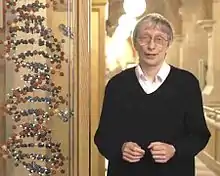 |
David Deutsch | "For his seminal conceptual contributions on quantum Turing machine and Quantum algorithm" | Theory | [1] | |
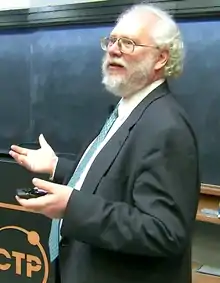 |
Peter Shor | "For his groundbreaking theoretical work on factoring algorithm and quantum error correction" | ||||
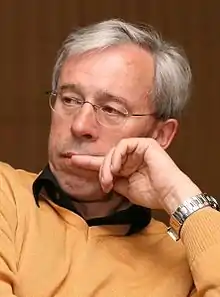 |
Peter Zoller | "For their outstanding theoretical contributions that enabled the scalable implementations of quantum information processing such as quantum computation with trapped ions, quantum simulation with ultracold atoms, and quantum repeaters" | ||||
.jpg.webp) |
Ignacio Cirac | |||||
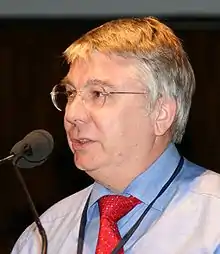 |
Rainer Blatt | "For his pioneering experimental work on the realizations of quantum logic gates, multiparticle entanglement, quantum simulation, and quantum computing algorithms using trapped ions" | Experimental | |||
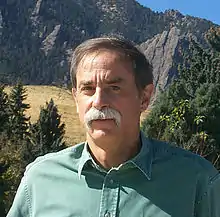 |
David Wineland | "For his groundbreaking experiments that opened the way to quantum computing and quantum metrology with trapped ions" | ||||
| 2019 | Stephen Wiesner | "For his original conceptual idea on conjugate coding that inspired the discovery of practical quantum cryptography" | Theory | [2] | ||
| Charles H. Bennett | "For their inventions of quantum key distribution, quantum teleportation, and entanglement purification" | |||||
.jpg.webp) |
Gilles Brassard | |||||
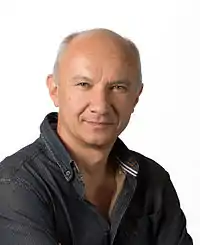 |
Artur Ekert | "For his inventions of entanglement-based quantum key distribution, entanglement swapping, and entanglement purification" | ||||
| Pan Jianwei | "For their groundbreaking experiments in multi-photon interferometry and free-space quantum transmission that enabled practically secure and large-scale quantum communications" | Experimental | ||||
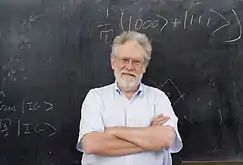 |
Anton Zeilinger | |||||
| 2020 | 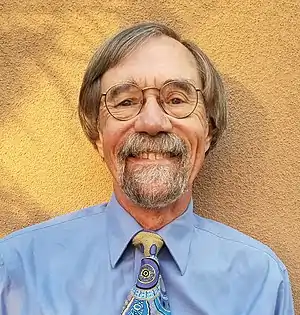 |
Carlton M. Caves | "For his foundational work on quantum metrology and quantum information theory, especially for elucidating the fundamental noise in interferometers and its suppression with the use of squeezed states." | Theory | [3] | |
| Hidetoshi Katori | "For their groundbreaking achievements in precision quantum measurements, in particular for the development of extremely stable and accurate optical atomic clocks." | Experimental | ||||
.jpg.webp) |
Jun Ye | |||||
References
- "Micius Quantum Prize 2018". Micius Quantum Foundation. Retrieved 26 December 2020.
- "Micius Quantum Prize 2019". Micius Quantum Foundation. Retrieved 26 December 2020.
- "Micius Quantum Prize 2020". Micius Quantum Foundation. Retrieved 26 December 2020.
This article is issued from Wikipedia. The text is licensed under Creative Commons - Attribution - Sharealike. Additional terms may apply for the media files.
